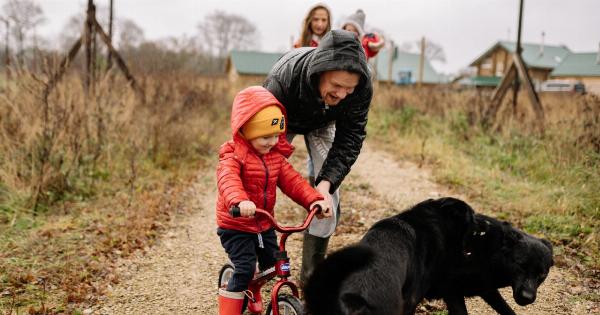Socialization is a crucial aspect of raising a well-behaved and balanced dog. It involves exposing your furry friend to various people, animals, environments, and situations in a controlled and positive manner.
Socializing your dog is not just a luxury; it is a necessity for their overall well-being, behavior, and happiness.
1. Build Confidence and Reduce Fear
One of the primary reasons why every dog needs to be socialized is to build their confidence and reduce fear.
When they are regularly exposed to different people, animals, and environments, they learn to feel more comfortable and confident in various situations.
If a dog is not properly socialized, they may become fearful and anxious in new and unfamiliar situations. This can lead to behavioral issues such as aggression, excessive barking, or withdrawal.
By socializing your dog, you help them gain confidence and learn to navigate the world with ease.
2. Develop Proper Behavior
Socialization plays a critical role in shaping a dog’s behavior. When a dog is exposed to different people, animals, and situations from a young age, they learn how to interact appropriately and adapt to various environments.
They understand how to greet other dogs, approach people, and respond to different stimuli.
A well-socialized dog tends to exhibit proper behavior and has a lower chance of developing behavioral problems.
They are more likely to be friendly, well-mannered, and adaptable in different situations, making them a joy to have around both at home and in public spaces.
3. Enhance Social Skills
Just like humans, dogs are social creatures. By socializing your dog, you provide them with the opportunity to develop and enhance their social skills.
They learn how to communicate effectively with other dogs, understand body language, and establish appropriate boundaries.
Dogs that are not properly socialized may struggle to interact with other animals or exhibit inappropriate behaviors during social interactions. This can lead to conflicts and strained relationships with other dogs.
Socializing your dog helps them become more socially adept, leading to positive and enjoyable interactions with both humans and other animals.
4. Prevent Fear and Aggression
Proper socialization can significantly reduce the likelihood of fear and aggression in dogs. Dogs that are not exposed to different environments, people, and animals may become fearful or defensive when faced with unfamiliar situations or individuals.
By gradually introducing your dog to new experiences and providing positive associations, you can help them learn that new situations are not threatening. This exposure reduces the chances of them reacting aggressively out of fear.
Socializing your dog is especially important for breeds that are prone to fear-based aggression to ensure they grow up to be well-adjusted and non-reactive.
5. Ensure Safety
Socializing your dog is essential for their safety as well as the safety of others. A well-socialized dog is less likely to exhibit unpredictable or aggressive behavior, reducing the risk of bites or attacks.
They are better equipped to handle encounters with strangers, other animals, or potentially stressful situations.
Furthermore, socialization can teach your dog to respond positively to commands and recall, making it easier for you to keep them safe in various environments.
A solid recall and an understanding of basic commands can prevent them from running into dangerous situations such as oncoming traffic, potentially saving their life.
6. Create Opportunities for Exposure
Socializing your dog opens up a world of opportunities for exposure to different stimuli. Take your dog to dog parks, obedience classes, or training sessions where they can interact with other dogs and people in a supervised and controlled environment.
These experiences provide valuable learning opportunities and help your dog become more comfortable with their surroundings.
Additionally, exposing your dog to various environments, such as walks in urban areas, trips to the beach, or visits to pet-friendly establishments, enriches their lives and broadens their experiences.
Regular exposure helps them become adaptable and confident in different settings, making outings and adventures more enjoyable for both of you.
7. Promote Mental Stimulation
Socialization is not only about interactions; it also promotes mental stimulation. Introducing your dog to new experiences, people, and environments keeps their minds active and engaged.
Dogs that are not adequately socialized may become bored and develop behavioral issues as a result.
When dogs experience new things, their brains are stimulated, which helps prevent boredom and destructive behaviors. This mental stimulation keeps them engaged, happy, and fulfilled.
Socialization should not be limited to their early months—it should be a lifelong process to continually challenge their minds and prevent stagnation.
8. Strengthen the Bond
Proper socialization helps strengthen the bond between you and your furry companion. When you participate in socialization activities together, you build trust and create positive associations with new experiences.
Your dog learns that they can rely on you for guidance and support in unfamiliar environments, making them feel secure and confident.
The bond between a well-socialized dog and their owner is based on mutual trust, respect, and understanding.
This strong bond fosters a harmonious relationship and lays the foundation for effective training, clear communication, and a lifetime of companionship.
9. Support Well-Being and Happiness
Socializing your dog is not just about behavior; it also contributes to their overall well-being and happiness. Dogs are social animals that thrive on companionship and interaction.
Lack of socialization can lead to loneliness, anxiety, and stress in dogs.
When dogs are properly socialized, they have the opportunity to make new friends, engage in positive interactions, and experience the world alongside their human companions.
This social connection and sense of belonging contribute to their happiness and emotional well-being.
10. Prevent Behavioral Issues
Another significant reason why every dog needs to be socialized is to prevent the development of behavioral issues. Dogs that are not adequately socialized may exhibit fearful, aggressive, or reactive behavior.
Behavioral issues can significantly impact their quality of life and may even result in difficult situations where management becomes challenging.
By socializing your dog from an early age and throughout their lives, you can prevent the development of such issues and ensure a well-adjusted and happy furry friend.
In conclusion, socializing your dog is an essential aspect of responsible pet ownership.
It offers numerous benefits, including building confidence, developing proper behavior, enhancing social skills, preventing fear and aggression, ensuring safety, creating opportunities for exposure, promoting mental stimulation, strengthening the bond, supporting well-being and happiness, and preventing behavioral issues.
Remember, socialization should begin early in your dog’s life and continue throughout their entire lifespan.
By providing positive experiences and exposure to various environments, people, and animals, you can raise a well-socialized dog that is a delight to be around and a cherished member of your family.

























